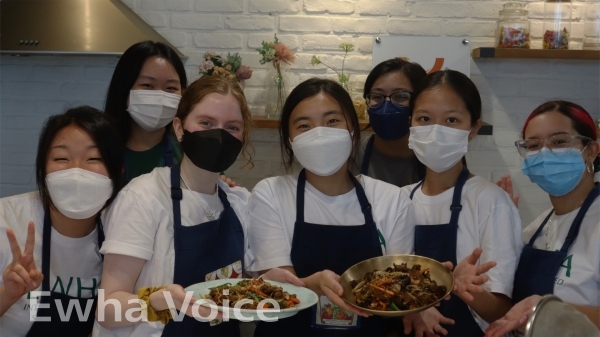
Starting off with the summer semester, the school announced a complete transition from online to in-person classes for all courses. The news brought additional changes, such as conducting Ewha International Summer College (EISC) both online and offline and accepting the maximum capacity of residents for school dormitories.
As the upcoming fall semester may be a completely new experience for all in three years since the outbreak of COVID-19, students expressed mixed opinions on the recent transition.
Jeong Ji-su, a junior from the Department of Health Convergence, has visited the school twice a week during the spring semester.
Once Jeong noticed the liveliness of the campus, she could finally sense the feeling of going to college sinking in.
What satisfied Jeong the most was being able to be completely present in class. As most online classes are held through prerecorded videos, she had always felt a limitation in understanding all the class materials. Moreover, since video lectures simply require watching them, she found herself procrastinating to take the lectures until the last minute. Although taking online lectures allowed her to watch the recorded lectures whenever she wants, which allowed her to manage her schedule more flexibly, she soon realized offline classes suit her better as they made her dedicate full participation on-site.
However, on the other hand, Jeong faced trouble balancing commute and the time gaps in between classes. The hour-and-a-half commute often exhausted Jeong and even felt like a waste of time. On top of that, she could not ignore the inconvenience of the empty time periods in between classes she had on some days.
Since Jeong only had a few chances to meet people last semester, she looks forward to making new friends by bonding with her classmates once everyone is back to school.
EISC was partially implemented in person for the first time since the pandemic. Offering a wide-ranging curriculum for both female and male students from overseas colleges, EISC is divided into two sessions, consisting of academic courses and Korean language courses. This year, both academic and Korean language courses were conducted either in-person or online. Laine Stover, majoring in Political Science & International Studies at West Virginia Wesleyan College (Wesleyan), shared her personal experience based on the program.
Wesleyan does not have any particular policies to cope with the pandemic situation at the moment, but rather resort to follow guidance from the Center for Disease Control of the United States.
“My school made national news this time last year for our COVID-19 policies, which were some of the strictest in the country,” Stover said. “But as of now, almost all restrictions have been lifted, and we do not even have to get tested before going back to the United States.”
In comparison to Wesleyan, to attend EISC, Stover had to take a PCR test both before leaving the United States and as soon as she landed in South Korea. Also, as the mask mandate is still in effect, Stover was not concerned about the COVID-19 status in South Korea, and therefore, felt safer here than she did in her country.
According to a survey of 120 students conducted by Ewha Voice from Aug. 10 to Aug. 21, 60 percent of students responded that they most look forward to the Daedong Festival. The remaining 55 percent, 30 percent, and 21.7 percent each replied that they anticipate studying at the library during the exam period, spending their spare time on the campus, the ECC movie screenings in particular. Other followed responses were meeting classmates and professors, club activities, and the enhancement in the quality of the classes.
Meanwhile, 13 percent of the respondents expressed their concern about the COVID-19 situation since there is still a significant number of new cases being reported daily. Especially, Chapel, a mandatory course that undergraduate students have to take for eight semesters before graduation, requires attendees to gather at Welch-Ryang Auditorium. However, something to take into consideration is the conglomeration of people crowded in the enclosed area at the same time might be dangerous due to the inability to keep social distancing measures.
One of the respondents who wished to remain anonymous stated that the school’s decision to shift online classes to in-person classes was hard to understand as the COVID-19 situation has not been entirely resolved yet. She also added the school needs to come up with official countermeasures before the semester starts in case the students get infected on campus.

